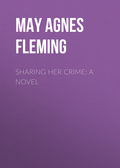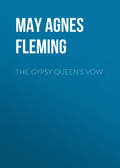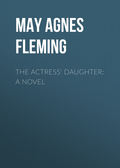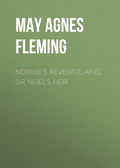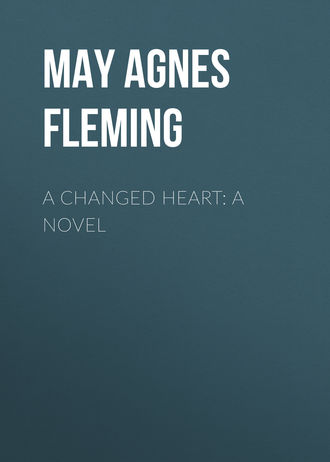
May Agnes Fleming
A Changed Heart: A Novel
CHAPTER XVI.
A CRIME
What was done that night?
At the very hour of that fine August morning that Mr. Charles Marsh and Miss Cherrie Nettleby had the surgery of Dr. Leach so comfortably to themselves, that medical gentleman up at Redmon, helping its mistress to fight out a battle with death. Yes, on that hot summer morning Lady Leroy was likely to die, stood even within the portal of the Valley of the Shadow, and Redmon and all earthly possessions seem about to slip from her forever. Good-natured Miss Jo, in the early morning, had sent up a present of a basket of cucumbers and lettuce, of both of which specimens of the vegetable kingdom Mrs. Leroy had partaken, well soaked in vinegar, as a sharpener to breakfast appetite. The consequence was, that before that repast was well down, she was seized with such convulsive cramps as only cholera patients ever know. Brandy applied inwardly, and hot flannel and severe rubbing applied outwardly, being without avail, Dr. Leach was sent for in hot haste. The old woman was in agonies, and Nathalie frightened nearly out of her wits. Dr. Leach looked grave, but did his best. For some hours it was quite uncertain whether he or the grim Rider of the Pale Horse would gain the battle: but victory seated herself at last on the medical banner of the Speckport physician. Mrs. Leroy, totally exhausted with her fierce sufferings, took an opiate and fell asleep, and the doctor took his hat to leave.
"She'll do well enough now, Miss Natty," he said, "only pitch the cucumbers into the fire the first thing. She'll be all right to-morrow."
Nathalie sat patiently down in the steaming and oppressive sick-room, to keep watch. The house was as still as a tomb; Midge was buried in the regions below, and the sick woman slept long and profoundly.
Nathalie took a book, and, absorbed by it, did not notice when Lady Leroy awoke. Awake she did, after some hours, and lay there quite still, looking at the young girl, and thinking. Of what? Of the long and weary months that young girl had in a manner buried herself alive in this living tomb of a house, to minister to her, to arrange all her business, to read to her, to talk to her, to do her all manner of good service, and to bear patiently her querulousness and caprice. It had been a lonely and eerie life for her, but when had she ever complained? and now what was she to gain by it all! For one act of disobedience she was disinherited – all these months and years wasted for nothing. She had come there in the belief – implanted by Mrs. Leroy herself – that she was to be the heiress of Redmon. Had she any right to go back from her word – to make her memory accursed – to go into that shadowy and unknown world opening before her with a lie on her soul? Dared she do it? She had an awful fear of death, this miserly old woman – an awful fear of what lay beyond death; and yet, with strange inconsistency, she felt herself on the verge of the grave – a long life of sin lying behind her, and making no effort to atone – only letting herself drift on. Yet is the inconsistency strange? Are we not, every one of us, doing the same? We are younger, perhaps, and fuller of life; yet do we not know the terrible truth, that death and ourselves are divided but by a single step?
Nathalie, bending over her book, all her fair hair dropping loose about her, saw not the eyes so closely watching her. How pale she looked. Perhaps it was the fright, not yet over; perhaps the heat; but her face was like a lily-leaf. While she watched her, Midge came softly in, and Mrs. Leroy closed her eyes again.
"Is she sleeping still?" Midge asked, looking toward the bed.
"Yes," said Nathalie, glancing up.
Midge bustled out, and presently returned with a cup of tea.
"Who do you think was here this morning to say good-bye?" she asked, while Nathalie was drinking it.
"I don't know. Who?"
"Cherrie Nettleby, no less. She wanted to come up here whether or no, to see you and the missis, but I sent her to the right about quicker. The flyaway good-for-nothing's off to Greentown in the cars this afternoon."
"Indeed. And how long is she going to stay?"
"I told her I was glad to hear it," said Midge, "and that I hoped she wouldn't come bothering back in a hurry; and she laughed and shook back them black curls of hers, and said perhaps she would stay all summer. The place is well rid of her, and I told her so."
Nathalie, reverting to Charley, perhaps, thought the same, but she did not say so. Midge departed, refreshed by her bit of gossip, and Nathalie resumed her book. The steaming sick-room was irksome enough to her, but she would not leave Mrs. Leroy even for a moment in her present state. That old lady opened her eyes again; and as she did so, Midge came bolting back.
"Miss Natty, here's Mr. Tom Oaks come to pay that there money, I expect. Shall I send him off again?"
Before Nathalie could reply, Lady Leroy half sat up in bed, feeble as she was, the ruling passion strong in death.
"No, no, no!" she shrilly cried, "don't send him away. Fetch him up here – fetch him up!"
Nathalie dropped her book and was bending over her directly.
"Dear Mrs. Leroy, are you awake? How do you feel now?"
"Better, Natty, better. Fetch him up, Midge – fetch him up."
Midge trotted off, soliloquizing as she went:
"Well, I never! I do think if she was dead and buried, the sound of money jingling atop of her grave would bring her out of it. You're to come up, Mr. Oaks. Missis is sick abed, but she'll see you."
Mr. Tom Oaks, a dashing young fellow, well-looking of face, and free and easy of manner, strolled in, hat in hand. Nathalie rose to receive him.
"Good day to you, Miss Nathalie. How are you, Mrs. Leroy? Nothing the matter, I hope."
"She is better, now," said Nathalie, placing a chair for him by the bedside.
"I suppose you've come up to pay the money?" Mrs. Leroy inquired, her fingers beginning to work, as they always did when she was excited.
Yes, Mr. Oaks had come to pay the money and obtain possession of the documents that made him master of Partridge Farm. Sundry papers were signed and handed over – a long roll of bank-bills, each for fifty pounds, were presented to Lady Leroy and greedily counted by her, over and over again. Then Nathalie had to go through the performance, and the roll was found to be correct. Mr. Oaks, master of a magnificent farm, bowed himself out, the perspiration streaming from every pore.
When he was gone, the old woman counted the bills over again – once, twice, three times; her eyes glittering with the true miser's delight. It was not to make sure of their accuracy, but for the pure and unalloyed pleasure it gave her to handle so much money and feel that it was hers.
A knock at the front door. Mrs. Leroy rolled the bills hastily up.
"Give me the box, Natty; some one's coming, and it's not safe to let any one know there's so much money in the house, and only three poor lone women of us here."
Nathalie handed her the large japanned tin box Cherrie had spoken of, which always stood at the head of the bed, and the bills were placed in it, the tin box relocked and replaced, before the visitor entered. It proved to be Lawyer Darcy; and Nathalie, availing herself of his presence, left the room for a few moments to breathe purer air.
"I was very sorry to hear of your illness," the lawyer said, "and ran in as I was going by, although I am in rather a hurry. By the way, I am expecting every day to be summoned back here to alter that last unjust will of yours. I hope you have begun to see its cruel injustice yourself."
"Yes," Lady Leroy gravely replied, "I have. There is no one living has so good a right to whatever I possess as Nathalie Marsh. I did wrong to take it from her, but it is not too late yet. Come up here to-morrow morning and draw out another – my last will – she shall have everything I own."
The old lawyer grasped the sick woman's hand delightedly.
"Thank heaven, my dear Mrs. Leroy, that you have been brought to see matters in their true light. Natty's the best girl alive – ain't you, Natty?"
"What, sir?" Nathalie asked, as she re-entered the room.
"The best and prettiest girl alive! There, don't blush. Good afternoon to you both. I'll be up to-morrow morning without fail, Mrs. Leroy, and I trust I shall find you quite restored."
He went out. How little did he think that never again, this side of eternity, should he meet that woman; how little did he think that with those words he had bidden her an eternal farewell.
Midge brought up some tea and toast to her mistress after the lawyer's departure; and feeling more comfortable after it, the old woman lay back among her pillows, and requested her ward to "read a piece for her."
The book Nathalie was reading had been one of her father's, and she loved it for his sake and for its own. It was not a novel, it was "At the Foot of the Cross," by Faber; and seating herself by the bedside, she read aloud in her sweet, grave voice. The touching story of Calvary was most touchingly retold there; more than once the letters swam on the page through a thick mist of tears, and more than once bright drops fell on the page and blistered it.
The long, sultry afternoon hours wore over, and in that shuttered room it had grown too dark to see the words, before the girl ceased. There was a silence; Nathalie's heart was full, and Mrs. Leroy was quiet, looking unwontedly thoughtful.
"It's a beautiful book," she said, at last, "a beautiful book, Natty; and it does me good to hear it. I wish you had read to me out of that book before!"
"I will read it all through to you," Nathalie said; "but you are tired now, and it is past seven. You had better have some tea, and take this opiate and go to sleep. You will be quite well again to-morrow."
Nathalie got the old woman's tea herself, and made the toast with her own white hands. Mrs. Leroy wished her to share the meal, but Nathalie could not eat there; the steaming and fetid atmosphere of that close chamber made her sick and faint. She was longing for the old woman to go to rest for the night, so that she might get out. She removed the tea-tray, and turned to leave the room.
"I am going out for a walk in the grounds," she said, "but I will be back by eight to give you the sleeping draught; and, for fear you might be taken ill again in the night, I will ask one of the Nettlebys to sleep here."
Without hat or mantle, she ran down-stairs and out into the hot twilight. The brassy hue of the sky, and the greenish-yellow haze filling the air, the ominous silence of nature, and the scudding black clouds, gave her warning for the first time of the coming storm.
She went down the avenue, through the gate, and along the dusty road to the cottage. The roses about it were hanging their heavy heads, the morning-glories and the scarlet-runners looked limp and wilted. She found Ann washing the dishes, and the two young Nettlebys lying lazily on the grass behind the cottage, smoking pipes. Nathalie proferred her request, and Rob Nettleby at once volunteered.
"I'll go up in half an hour, Miss Natty," he said, "and, if I'm wanted, I can gallop into town in ten minutes."
"Thank you, Rob!"
She went back to the kitchen, lounging a minute before she left.
"And so Cherrie's gone, Ann?"
"Yes," said Ann; "and I'm glad of it. We will have some peace for a while, which we don't have when she's here, with her gadding."
Nathalie walked slowly back to the house, wondering and awed by the weird and ghostly look of the sky. The evening was so close and oppressive that no breath of air was to be had; yet still it was better than the house, and she lingered in the grounds until the lightning shot out like tongues of blue flame, and the first heavy raindrops began to fall.
Hurrying in out of the coming storm, followed by Bob Nettleby, who opined it was going to be a "blazer of a night," she saw that all the doors and windows were secured, and then returned to Mrs. Leroy's room to administer the opiate. She found the old woman in a doze, from which her entrance aroused her, and raised her with her right arm in bed, while she held the glass to her lips with her left hand.
"It will make you sleep, dear Mrs. Leroy," the girl said, "and you will be as well as ever to-morrow."
"I hope so, Natty. – Is that thunder?"
"Yes; it is going to be a stormy night. Is there anything else I can do for you before I go?"
"Yes; turn down that lamp; I don't like so much light."
A little kerosene lamp burned on the table. Nathalie lowered the light, and turned to go.
"Good-night," she said, "I will come in once or twice through the night to see how you are. You are sure you do not want anything more?"
The sleeping-potion was already taking effect. The old woman drowsily opened her eyes:
"No," she said; "nothing else. You're a good girl, Natty, and it was wrong to do it; but I'll make it all right, Natty; I'll make it all right!"
They were the last words she ever spoke! Nathalie wondered what she meant, as she went into her own room, and lit her lamp.
The storm without was raging fast and furious; the blaze of the lightning filled the room with a lurid blue glare, the dull and ceaseless roll of the thunder was appalling, and the rain lashed the windows in torrents.
"Heaven help any poor wanderer exposed to such a tempest!" Nathalie thought.
If she had only known of him who cowered under the spruce bushes on Redmon road, waiting for it to subside.
Nathalie brushed out her long, shining, showering curls, bathed her face, and said her prayers. The furious and short-lived tempest had raged itself out by that time, and she blew out the lamp and sat down by the window – it was too hot to go to bed. She made a pile of the pillows, and leaned her head against them where she sat; and, with the rushing rain for her lullaby, fell asleep.
What was that? She awoke with a start. She knew she had not slept long, but out of a disturbed dream some noise awoke her – a sharp metallic sound. Her room was weirdly lighted by the faint rays of the wan and spectral moon, and with her heart beating thick and fast she listened. The old house was full of rats – she could hear them scampering over her head, under her feet, and between the partitions. It was this noise that had awoke her; the trees were writhing and groaning in the heavy wind, and tossing their green arms wildly, as if in some dryad agony – perhaps it was that. She listened, but save these noises all was still. Yes, it was the rats, Nathalie thought, and settling back among the pillows once more, she fell into another light slumber.
No, Nathalie. Neither the wailing wind, nor the surging trees, nor the scurrying rats made the noise you heard. In the corridor outside your room a tall, dark figure, with a black crape mask on its face, is standing. The figure wears a long overcoat and a slouched hat, and it is fitting a skeleton key in the lock of Mrs. Leroy's door; for Nathalie has locked that door. Like some dark and evil spirit of the night, it glides into the chamber; the lamp on the table burns low, and the old woman sleeps heavily. Softly it steals across the room, lays hold of the japanned tin box, tries key after key from a bunch it carries, and at last succeeds. The box is open – the treasure is found. Fifty – fifty – fifty! they are all fifties – fifty-pound notes on good and sound Speckport banks. The eyes behind the mask glitter – the eager hands are thrusting the huge rolls into the deep pockets of the overcoat. But he drops the last roll and stops in his work aghast, for there is an awful sound from the bed. It is not a scream, it is not a cry; but something more awful than ever came from the throat of woman in all the history of woman's agony. It is like the death-rattle – hoarse and horrible. He turns and sees the old woman sitting up in bed, one flickering finger pointing at him, the face convulsed and livid, the lips purple and foaming, the eyes starting. One cry, and all for which he has risked so much will be lost! He is by the bedside like a flash; he has seized one of the pillows, and hurled her back; he has grasped her by the throat with one-powerful hand, while with the other he holds the pillow over her face. Fear and fury distort his own – could you see it behind the mask – and his teeth are set, and his eyeballs strained. There is a struggle, a convulsive throe, another awful rattle in the throat, and then he sees the limbs relax, and the palpitating throat grow still. He need fear no cry now; no sound will ever again come from those aged lips; the loss or gain of all the treasures in the wide earth will never disturb her more. He loosens his grasp, removes the pillow, and the lamplight falls on a horrible sight. He turns away with a shudder from that blackened and convulsed visage, from the starting eyes forced out of their sockets, and from the blood which trickles in a slow, dreadful stream between purple lips. He dare not stop to look or think what he has done; he thrusts the last roll into his pocket and flies from the room. He is so furiously impatient now to get away from that horrible thing on the bed, that he forgets caution. He flies down the stairs, scarcely knowing that the noise he makes echoes from cellar to attic of the silent old house. He takes the wrong turning, and swears a furious oath, to find himself at a door instead of the window by which he had entered. He hears a shriek, too; and, mad with terror, tears off his mask and turns down another passage. Right at last! this is the window! He leaps through it – he is out in the pale moonlight, tearing through the trees like a madman. He has gained the road – a horse stands tied to a tree, and he leaps on his back, drives his spurs furiously into the beast's side, and is off like the wind. In ten minutes, at this rate, he will be in Speckport, and safe.
The apartment in which Midge sought sleep after the fatigues of the day, was the kitchen, and was on the first floor, directly under Lady Leroy's room. She had quartered Rob Nettleby in the adjoining apartment – a big, draughty place, where the rats held grand carnival all the year round. Midge, like all honest folks in her station, who have plenty of hard work, and employ their hands more than their heads, was a good sleeper. But on this stormy August night Midge was destined to realize some of the miseries of wakefulness. She had not dared to go to bed during the first fury of the storm; for Midge was scared beyond everything by lightning and thunder; but after that had subsided, she had ventured to unrobe and retire. But Midge could not sleep. Whether it was the heat, or that the tempest had made her nervous, or why or wherefore, Midge could never afterward tell; but she tossed from side to side, and listened to the didoes of the rats, and the whistling of the wind about the old house, and the ghostly moonlight shimmering down through the fluttering leaves of the trees, and groaned and fidgeted, and felt just as miserable as lying awake when one wants to go asleep, can make any one feel. There were all sorts of strange and weird noises and echoes in the lonely old house; so when Midge fancied she heard one of the back windows softly opened, and something on the stairs, she set it down to the wind and the rats, as Nathalie had done. She heard the clock overhead in Lady Leroy's room – the only timepiece in the house – strike eleven, and thought it had come very soon; for it hardly seemed fifteen minutes since it had struck ten. But she set this down to her fidgetiness, too; for how was she to know that the black shadow in the room above had moved the hands on the dial-plate before quitting? But that other noise! this is no imagination, surely. Midge starts up with a gasping cry of affright. A man's step is on the stairs – a man's hurried tread is in the hall – she hears a smothered oath – hears him turn and rush past her door – hears a leap – and then all is still. The momentary spell that has made Midge speechless is broken. She springs to her feet – yes, springs, for Midge forgets she is short and fat and given to waddling, in her terror, throws on the red flannel undergarment you wot of, and rushes out of her room and up-stairs, shrieking like mad. She cannot conceive what is the matter, or where the danger lies, but she bursts into Nathalie's room first. Nathalie, aroused by the wild screams from a deep sleep, starts up with a bewildered face. Midge sees she is safe, and still uttering the most appalling yells, flies to the next, to Lady Leroy's room, Nathalie after her; and Mr. Rob Nettleby, with an alarmed countenance and in a state of easy undress, making his toilet as he comes, brings up the rear.
"What is it? Is Mrs. Leroy worse?" he asked, staring at the shrieking Midge.
"There's been somebody here – robbing and murdering the house! Ah – h – h – !"
The shriek with which Midge recoiled was echoed this time by Nathalie. They had entered the fatal room; the lamp still burned on the table, and its light fell full on the livid and purple face of the dead woman. Dead! Yes, there could be no doubt. Murdered! Yes, for there stood the open and rifled box which had held the money.
"She's killed, Rob Nettleby! She's murdered!" Midge cried, rushing headlong from the room; "but he can't have got far. I heard him going out. Come!"
She was down the stairs with wonderful speed, followed by the horrified Nettleby. Midge unlocked and flung open the hall-door, and rushed in the same headlong way out. There was a man under the trees, and he was running. With the spring of a tigress Midge was upon him, her hands clutching his collar, and her dreadful yell of "Murder!" piercing the stillness of the night. The grasp of those powerful hands was not to be easily shaken off, and Rob Nettleby laid hold of him on the other side. Their prisoner made no resistance; he was too utterly taken by surprise to do other than stand and stare at them both.
"You villain! you robber! you murderer!" screamed Midge, giving him a furious shake. "You'll hang for this night's work, if anybody hung yet! Hold him fast, Rob, while I go and send your brother to Speckport after the p'lice."
The address broke the spell that held their captive quiet. Indignantly endeavoring to shake off the hands that held him, he angrily demanded what they meant.
Rob Nettleby, with a shout of astonishment, released his hold – he had recognized the voice. Midge, too, loosed her grasp, and backed a step or two, and Charley Marsh, stepping from under the shadow of the trees into the moonlight, repeated his question with some asperity.
"Charley!" Midge gasped, more horror-stricken by the recognition than she had been by the murder.
"What the deuce is the matter, Nettleby?" Charley demanded, impatiently. "What is all this row about?"
"There has been a murder done," said the young man, so confounded by the discovery as to be scarcely able to speak.
"Mrs. Leroy has been murdered!"
Charley recoiled with a white face.
"Murdered! Good heavens! When? By whom?"
"To-night – just now."
He did not answer the last query – he thought it superfluous. To his mind, Charley Marsh was as good as caught in the act.
"And Nathalie! Where is she? Is she safe?"
"She is in Lady Leroy's room."
Charley only waited for the answer, and made a precipitate rush for the house. The other two followed, neither daring to look at the other or speak – followed him up-stairs and into the chamber of the tragedy. All was as it had been. The ghastly and discolored face of the murdered woman was there, even the pillow, horrible to look at. But going partly across a chair as she had fallen, all her golden hair tossed about in loose disorder, and her face white, and fixed, and cold as marble, Nathalie lay near the center of the room. There, by herself, where the dreadful sight had first struck her, she had fainted entirely away.



